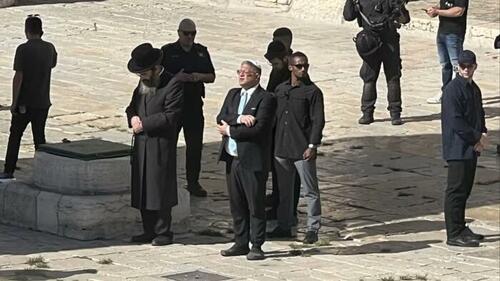
In recent years Saudi Arabia and Israel have been moving remarkably fast toward the restoration of official relations, in what's been called a highly anticipated 'deal of the century' - but the Gaza war in the wake of Oct.7 have put these efforts on hold and looks to derail the initiative altogether.
This week tensions have escalated, given that Muslims see current Israeli policies toward Al-Aqsa mosque in Jerusalem as very seriously threatening and an affront to their faith. Israel’s hard-line Security Minister Itamar Ben-Gvir this week went to so far as to call for a synagogue to be built atop Islam's third holiest site.

The remarks came during a Monday interview with Army Radio and immediately unleashed controversy, with some Israeli groups even condemning the remarks as needlessly inflammatory and unrealistic.
Ben-Gvir during the interview said that Jews should be allow unrestricted access to pray at the site of the Al-Aqsa mosque, which is situation upon what's called Temple Mount and the Western Wall, a sacred site for the Jews.
Any establishment of a synagogue or new (third) temple on the site would require the destruction of the Al Aqsa Mosque, possibly leading to Islamic uprisings in the region so large it could trigger broader war.
According to Ben-Gvir's words in the public broadcast interview:
"If I could do anything I wanted, I would put an Israeli flag on the site," Ben-Gvir said in the interview.
Asked several times by a journalist if he would build a synagogue at the site if it were up to him, Ben-Gvir finally replied: "Yes."
Saudi Arabia was quick to condemn the "extremist" words. "The kingdom affirms its categorical rejection of these extremist and inflammatory statements and its rejection of the continuous provocations of the feelings of Muslims around the world," an official statement reads.
It added, "The kingdom stresses the need to respect the historical and legal status quo of the blessed Al-Aqsa Mosque, renewing its call to the international community to fulfill its responsibilities in putting an end to the humanitarian disaster that the brotherly Palestinian people are enduring and to initiate serious mechanisms to hold Israeli officials accountable for the ongoing violations of international laws, norms, and resolutions."
Other governments in the region, especially Turkey, also condemned the Israeli national security minister's remarks:
Türkiye condemns Ben-Gvir's call to build synagogue inside Al-Aqsa Mosque
— The SETA Foundation at Washington DC (@SETADC) August 28, 2024
Türkiye has strongly condemned Israeli National Security Minister Itamar Ben-Gvir's recent remarks about building a synagogue within the Al Aqsa Mosque compound, calling it a "new and extremely dangerous"… pic.twitter.com/u8Ld7JCayV
The Saudi kingdom oversees the two holiest sites in Islam of Mecca and Medina, and hosts annual Haj (pilgrimage) events, and so Riyadh often serves the role of a global spokesman for broader Islamic issues.
In recent years Saudi Arabia and Israel have been moving remarkably fast toward the restoration of official relations, in what’s been called a highly anticipated ‘deal of the century’ – but the Gaza war in the wake of Oct.7 have put these efforts on hold and looks to derail the initiative altogether.
This week tensions have escalated, given that Muslims see current Israeli policies toward Al-Aqsa mosque in Jerusalem as very seriously threatening and an affront to their faith. Israel’s hard-line Security Minister Itamar Ben-Gvir this week went to so far as to call for a synagogue to be built atop Islam’s third holiest site.

The remarks came during a Monday interview with Army Radio and immediately unleashed controversy, with some Israeli groups even condemning the remarks as needlessly inflammatory and unrealistic.
Ben-Gvir during the interview said that Jews should be allow unrestricted access to pray at the site of the Al-Aqsa mosque, which is situation upon what’s called Temple Mount and the Western Wall, a sacred site for the Jews.
Any establishment of a synagogue or new (third) temple on the site would require the destruction of the Al Aqsa Mosque, possibly leading to Islamic uprisings in the region so large it could trigger broader war.
According to Ben-Gvir’s words in the public broadcast interview:
“If I could do anything I wanted, I would put an Israeli flag on the site,” Ben-Gvir said in the interview.
Asked several times by a journalist if he would build a synagogue at the site if it were up to him, Ben-Gvir finally replied: “Yes.”
Saudi Arabia was quick to condemn the “extremist” words. “The kingdom affirms its categorical rejection of these extremist and inflammatory statements and its rejection of the continuous provocations of the feelings of Muslims around the world,” an official statement reads.
It added, “The kingdom stresses the need to respect the historical and legal status quo of the blessed Al-Aqsa Mosque, renewing its call to the international community to fulfill its responsibilities in putting an end to the humanitarian disaster that the brotherly Palestinian people are enduring and to initiate serious mechanisms to hold Israeli officials accountable for the ongoing violations of international laws, norms, and resolutions.”
Other governments in the region, especially Turkey, also condemned the Israeli national security minister’s remarks:
Türkiye condemns Ben-Gvir’s call to build synagogue inside Al-Aqsa Mosque
Türkiye has strongly condemned Israeli National Security Minister Itamar Ben-Gvir’s recent remarks about building a synagogue within the Al Aqsa Mosque compound, calling it a “new and extremely dangerous”… pic.twitter.com/u8Ld7JCayV
— The SETA Foundation at Washington DC (@SETADC) August 28, 2024
The Saudi kingdom oversees the two holiest sites in Islam of Mecca and Medina, and hosts annual Haj (pilgrimage) events, and so Riyadh often serves the role of a global spokesman for broader Islamic issues.
Loading…





